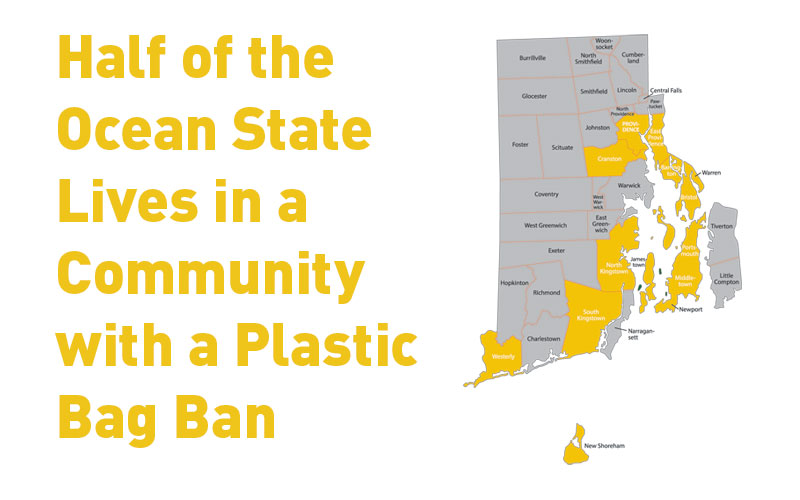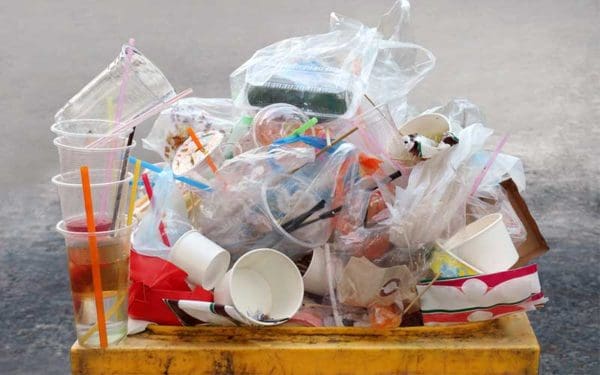
This past legislative session, a few New England states made waves in the fight against plastic pollution. Maine passed two statewide bans – one on single-use plastic bags and another on polystyrene – while Connecticut passed a statewide bag ban. Vermont went a step further, passing the most comprehensive plastics ban in the entire country. Its groundbreaking law prohibits bags, stirrers, and polystyrene food packaging, and requires that plastic straws be available only upon request.
Rhode Island, too, considered bans on bags and polystyrene during its last legislative session. Unfortunately, the bag ban bill as introduced would have done more harm than good by wiping out stronger bans in our cities and towns and replacing them with a weaker law allowing for thick plastic bags. What’s more, the bill would have prevented individual communities from taking more serious action to end plastic pollution locally.
Fortunately, the bag ban bill did not become law. The Rhode Island polystyrene bill, modeled after the Maine bill, also failed.
But all is not lost for Rhode Island. Communities across the Ocean State continue to pick up the slack and take on this critical work.
Half of the Ocean State Lives in a Community with a Plastic Bag Ordinance
Rhode Island’s towns and cities refuse to stand idly by while the legislature fails to stem the tide of plastic bags. Following the lead of Barrington, 14 Rhode Island communities have enacted ordinances banning the use of plastic bags, including:
- Barrington
- Bristol
- Cranston
- East Providence
- Jamestown
- Middletown
- Newport
- New Shoreham
- North Kingstown
- Portsmouth
- Providence (bag ban takes effect on October 22, 2019)
- South Kingstown
- Warren
- Westerly
The total population of these communities adds up to about half a million people – 50 percent of the state’s population.
Each ordinance in these communities contains key language requiring a bag to have “stitched handles” to be classified as reusable. (The Vermont law included this local Rhode Island language.) The “stitched handles” requirement ensures that thicker plastic bags cannot be passed off as “reusable,” thereby flooding our lives with even more plastic.
Currently, East Greenwich is working to join this group and become the fifteenth community in Rhode Island to pass a bag ban. CLF testified in support of this ordinance.
Meanwhile, Barrington again has led the way by passing another ordinance in early 2019 that bans even more plastics, including cups, utensils, straws, and polystyrene.
Toxic and Dangerous: Why We Need Plastic Bag Bans
Plastics are ever-present in our lives, and so too are their toxic effects. Most often sourced from fracked gas, plastics are a fossil fuel product hiding in plain sight. Their extraction poisons communities with more than 170 different chemicals known to harm human health. The facilities that refine this fracked gas into plastic release dangerous toxics like carbon monoxide, nitrogen oxide, benzene, and toluene into nearby communities.
Every year, the United States goes through more than 380 billion plastic bags. We handle each bag for a matter of minutes before it ends up in a landfill or incinerator – or our environment. Plastic bags are the fifth most common item collected in the Ocean Conservancy’s beach cleanups. Ingesting or becoming entangled in plastic bags maims or kills countless whales, sea turtles, birds, fish, and other marine animals. And those bags not consumed by marine wildlife break down into microplastics and damage every level of the marine ecosystem.
Plastics pose equally severe risks to our climate. Plastics production is on the rise, and at the current rate of increase, its annual climate-damaging emissions will equal those from 549 coal-fired power plants by 2050.
Keep Up the Great Work!
In the year ahead, we at CLF will be pushing the Rhode Island legislature to pass a robust statewide ban on plastic bags, polystyrene, and stirrers, as well as limits on plastic straws. In the meantime, we stand with the towns and cities that have taken the initiative to eliminate wasteful, polluting, dangerous plastics from our lives. And, we will continue our fight to eliminate the plague of single-use plastic New England-wide.
CLF is happy to provide technical assistance to any community considering ordinances to curb single-use plastics.



